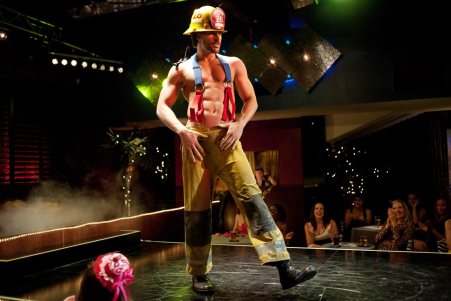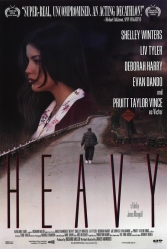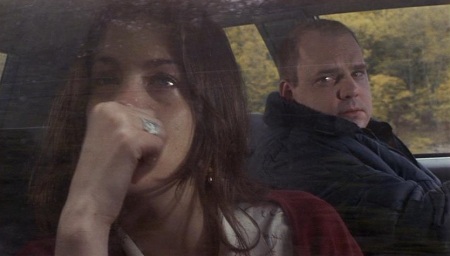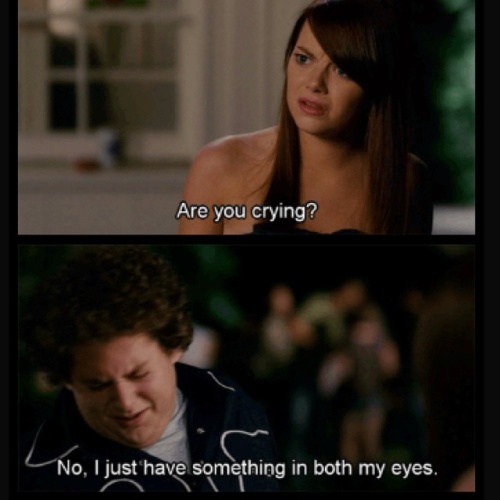Embarrassing confession time: I have been picking away at this article for way too long. Patrick had suggested Magic Mike and Magic Mike XXL a while ago, and they are chock full of great discussion material, especially regarding the shifts between the original and the sequel. I was fascinated by a mainstream Hollywood movie that plays fast and loose with the gender roles of its straight male protagonists; then, there’s also the obvious topic of the noticeably more inclusive casting of audience members in XXL. But how did they connect? Though initially struggling to form a cohesive argument, I finally relied on this one weird trick: I re-read the most famous essay in feminist film theory. And amazingly, it was very helpful.
Laura Mulvey’s 1975 essay “Visual Pleasure and Narrative Cinema” is the genesis of the term “male gaze.” Mulvey uses psychoanalytic theory to describe a common dynamic in classic Hollywood film, in which the audience derives a dual and seemingly contradictory pleasure in the voyeurism of watching the people on screen (separating the audience and the character), but also seeing the characters as idealized versions of ourselves (bringing audience and character together). And as the films utilizing this dynamic are produced in a patriarchal society (i.e. prioritizing the wants and experiences of men), female characters are on display for the audience’s voyeuristic pleasure, while male characters are powerful protagonists with whom the audience identifies. Often, these two dynamics synthesize in the romantic union of the male and female characters, creating the fantasy of being a powerful person who possesses the object of desire. Magic Mike, especially XXL, disrupts these dynamics that Mulvey describes.
True, none of the main characters in either film are fat. Most of the fat characters I write about on CPBS aren’t protagonists. While there are exceptions, as evidenced by most of the films in last year’s series on fat men and thin women, fat characters are usually minor supporting roles in a handful of scenes; this is especially obvious if you look at the writeups I’ve done of film festivals, etc. It would be overly glib to say that there’s one reason why, but stemming from Mulvey’s theory of the audience seeking pleasure through identification with a protagonist, the common assumption is that audiences can’t/won’t empathise with a character who doesn’t embody certain social privileges. Mulvey focuses on gender; but of course this struggle encompasses many identities. At the writing of this article, whitewashing is again a popular topic of discussion, as the remake of Ghost in the Shell starring ScarJo just hit theaters. But, as always, body size and composition is the spectrum we’ll be focusing on here. And the fat characters of particular interest in Magic Mike and XXL are the fat women in Mike’s (Channing Tatum) audience.

I didn’t find or make screencaps of the fat audience members, please accept my apology in the form of Joe Manganiello in a sexy firefighter costume
Magic Mike starts with a flipping of the male gaze’s gender dynamic by establishing the relationship between female audience and male performer. Dallas (Matthew McConaughey) titillates the audience by playfully reminding them that it is against the law to touch the dancers’ bodies (but then observes “a lot of law-breakers” in the audience); the women sitting in the dark respond with excited cheers. This mirrors a common paradox that attractive female characters must embody of being on display for the audience’s visual consumption but not too actively sexual as to land on the wrong side of social judgment (or break the fantasy of being controllable). Mike deals with this very judgment from the two main female characters, Brooke (Cody Horn) and Joanna (Olivia Munn). Through their relationships with Mike, we see his need to move on from his current profession. Joanna is willing to have casual sex with Mike and join him in orchestrating three-ways, but she isn’t willing to talk about her personal life with him and unceremoniously abandons him by revealing that she is engaged, which coincides with the completion of her PhD. Brooke is consistently judgmental of Mike’s profession throughout the movie; although he accuses her of reducing him to his job, eventually both his bff Adam (Alex Pettyfer) and his boss Dallas screw him over, proving that her disapproval is merited. Mike abruptly leaves the Kings, as Joanna left him, and shows up on Brooke’s doorstep. His happy ending is the approval of the “normal” character. His arc isn’t too different from the pattern I saw in films featuring fat men paired with thin women; Mike’s maturation make him attractive despite his excess (here his decadent profession, as opposed to his body), his reward is the love of a good (thin) woman. This is a neat gender inversion of the story arc that Mulvey describes, wherein a female character “falls in love with the main male protagonist and becomes his property, losing her… show-girl connotations; her eroticism is subjected to the male star alone.”
As opposed to typical scenes featuring female dancers, where the male audience is a source of some menace (I haven’t seen the whole of Striptease, but two of the dance scenes on YouTube include Demi Moore being grabbed inappropriately by audience members, as well as Burt Reynolds sitting in the corner and making creepy comments about how she’s an “angel”), the relationship between male dancers and female audience in the Magic Mike movies is free of tension. The pleasure the audience receives from direct attention from the male entertainers is pure, even sheepish at times, as select VIPs allow the dancers to pick them up, lie them on the floor, tie them in sex slings, etc. without any attempts to go too far. The exotic dancing is described as a service in both films, either embodying the fantasy of a one night stand, as per Dallas, or helping a woman find her “smile,” as per Mike. If anything, Adam is the only character to really transgress professional boundaries, as he kisses an audience member during his debut dance and give a tab of ecstasy to a sorority sister during a house call.
Magic Mike is focused on people struggling to realize their professional goals (or just make ends meet) in an unforgiving economic structure. The stripping, while surely an entertaining spectacle for at least some of the audience, is almost incidental to the film’s themes. As Magic Mike centers on Mike’s struggle to be a successful entrepreneur, the audience’s shrieks of delight and dollar bills symbolize the tyrannical demands of the market, showering him with money when he dances, while an apologetic bank employee (Betsy Brandt) withholds it when he tries to secure a loan to start his furniture business. And although the women themselves have no nefarious motives, they provide the money and attention that draws Adam into the life of a debauched party boy. XXL, on the other hand, focuses on Mike reconnecting with his friends, helping them move onto the next steps of their lives after Dallas abandons them, and coping with the stress of his new job and newly single status. He does all these things by rediscovering the joy of stripping, namely, helping his audience find their “smile.” Where the first film finds Mike concerned that Brooke only sees him as a “30 year old male stripper,” XXL states explicitly (ha) that Mike and the other Kings can use stripping to explore and assert themselves as individuals. Mike strives to impress the female characters in XXL, but unlike the judgment of his profession that he meets in Magic Mike, he instead interacts with women who are mostly involved in exotic dance in one way or another along his journey to Myrtle Beach, and has to charm them into providing assistance to get him and the Kings there. The political pathos is removed from Mike’s relationship with stripping in XXL, giving the viewer license to find pure erotic enjoyment in his performances. And yet, XXL breaks even further away from the “show-girl” trope Mulvey described, in which “a woman performs within the narrative, the gaze of the spectator and that of the male characters in the film are neatly combined.” Both films invert the roles that each gender plays in the dynamic, but in XXL, Mike’s friends assign personal meaning to male entertainment that gives more depth to their characters than they had in Magic Mike. The sequel gives us more of the personalities of the Cock Rocking Kings of Tampa and allows them to wax philosophical about the male entertainment industry, which is celebrated as an opportunity for all women deserve to have their fantasies indulged and to be “queens,” as opposed to the first film, which presents a glittery sandpit that is controlled by deceitful owners like Dallas and eats naive young men like Adam for breakfast.
A few different scenes in XXL explore the Kings’ relationship to their work, including one in which Ken (Matt Bomer) bonds with Andre (Donald Glover) over the meaning they find in male entertainment. “These girls have to deal with men in their lives every day who don’t listen to them,” Andre observes. “They don’t even ask them what they want. All we gotta do is ask them what they want. When they tell you, it’s a beautiful thing, man. We’re like healers or something.” A subsequent scene shows this philosophy in action when Ken meets an older woman (Jane McNeill) who confesses her husband won’t have sex with the lights on; he responds by telling her how beautiful she is, how she deserves to be happy, and sings her the song that she and her husband would listen to when they were first falling in love. The moment is bittersweet (“I don’t think Hank can do that!” she tells him when his performance ends), but shows more depth to what the audience seeks from the performers than the “free fling of a fuck” Dallas describes in Magic Mike. The Kings want to be the most effective entertainers possible; while the film plays out with the intent that the film audience see ourselves more as an extension of the Kings’ audience, there is joy in seeing the exhibition of their creativity and the gradual reveal of their personalities as much as there is of their oiled-up bits. The culmination of XXL finds Mike and his friends (now calling themselves “Res-erection”) fully in their element and fully belonging to the audience; as emcee Rome (Jada Pinkett Smith) describes them, “a special kind of beast that can bring all the beauty out in you.”
Even if the dancers aren’t normatively gendered in how they function in the films narrative, they are in physical presentation. The implication is, of course, that the man capable of “fulfilling every woman’s wildest fantasies” is relegated to one body type. And commonly, when men in movies are depicted as irresistable, the women chasing them are normatively attractive. The fantasy is specifically that of a man’s wanting to have numerous beautiful women chasing after him. However, the world of Magic Mike flips that to focus on the fantasy of a fun night of oogling hunks (without the drink minimum) by including a range of women in the audience. The first movie falls short. Notably, there are some audience members who are older women, but all are feminine and white. The only fat woman in Magic Mike is chosen for VIP treatment by Richie (Joe Manganiello), but he “humorously” hurts his back when picking her up and has to stop his routine, leaving her standing awkwardly by herself on the stage. XXL does an admirable job of diversifying the audience. Not only do several scenes include fat women getting individual attention from the male entertainers, but there is a specific focus on black women. We meet Rome, who addresses her black clientele as “queens” and repeatedly tells them that they are beautiful and deserving of attention from her sexy staff. We see many fat women in the audience, including an extended scene with a fat black woman receiving attention from a male entertainer who picks her up with ease (and is played by former pro football player Michael Strahan).

Rome, the queen in her castle, and Magic Mike (fka “White Chocolate”)
A pivotal moment in XXL hinges on an audience comprised of one fat woman: Richie’s dance in the convenience store. Richie (rolling on molly) wants to bring his wedding fantasy routine to fruition, but is insecure about his skills as a dancer. Mike (also rolling on molly), in an attempt to make his friend understand that their work is less about impressive dance moves and more about making women happy, dares him to walk into a convenience store and make the bored-looking cashier (Lindsey Moser) smile. Richie balks, not because the young woman is fat, but because she “looks like she’s never fucking smiled a fucking day in her entire life.” And, because it is that kind of movie, Richie’s beloved Backstreet Boys start playing on the store speakers the minute he walks into the store. Unlike the women who make up his intentional audience– and unlike the common stereotype of fat women as desperate for sex– the cashier doesn’t immediately notice him (much to his pouty disappointment). He has to dramatically tear open a bag of Cheetos just to get her attention, and she doesn’t even smile until the end of his routine, when he cracks a joke. Richie goes on a minor character development arc over the course of the scene, where he has to get in touch with his confidence and sense of presence to prove to himself that he doesn’t need Dallas’ direction to be a successful male entertainer. And the sign of his success is the approval of a fat, female audience, as well of that of his friends (all of whom are rolling on molly).
The other fat presence in the films must be mentioned, even if he doesn’t quite fit in with the discussion: Tobias, the DJ (Gabriel “Fluffy” Iglesias). He is a corrupting influence for Adam in the first film, giving him his first taste of GHB (or, as he calls it, “hey juice”) and supplying him MDMA to sell once he’s established himself as a dancer at Dallas’ club. Adam foolishly loses $10,000 worth of pills that he and Tobias were supposed to sell. This leads to two thugs trashing Mike’s apartment looking for restitution, while Tobias helplessly watches. However, to the more mature Kings who are presumably a bit wiser in their choices, he is more of a helpful support. In Magic Mike XXL, he drives the food truck to take them on their road trip to Myrtle Beach with the intention of being their emcee at the stripper convention–until he drives off the road while rolling and suffers a concussion. In both films, Tobias is vaguely coded as queer. In Magic Mike, we are introduced to him using stereotypically gay mannerisms to make a joke. In XXL, Tobias gets on stage dressed like Carmen Miranda at a voguing contest at a gay club; and considering that he wins the $400 prize after the Kings upstage the club’s regulars, he had better fucking be queer because that is the only way that such an incredibly cringe-worthy scene could be salvaged. At the afterparty following the scene at the gay club, he sits at a campfire with the club’s fat drag queen emcee (Vicky Vox), while the other Kings are paired with thin, (presumably) cis women. (This sequence includes a scene in which Mike meets Zoe [Amber Heard] and they bond over having “inner drag queens;” ick ick ick.)

Dallas and Tobias watch the boys do their thing
The aspect of XXL that is quite unlike any mainstream film I’ve seen in recent memory is not only the focus on the importance of pleasure (both giving and receiving) to a fulfilled life, but that pursuit is reinforced as egalitarian. And combined with Mulvey’s theory about the gaze, you get something pretty amazing. Instead of women performing as erotic spectacle for a male audience, you have men performing for an audience comprised not only of women, but of older women, fat women, and women of color. So the entity in the film that we, XXL’s audience, identify with is those people: older women, fat women, women of color. And it’s not for the purpose of learning something or becoming aware of an issue or struggle; it’s just to have some fun and feel sexy for a bit. It’s a subtle part of the movie, but it’s normalizing of these groups of marginalized women in a way that we rarely get to see. Even if XXL doesn’t answer Mulvey’s call to break down the “cinematic codes and their relationship to formative external structures” that enable the male gaze, it’s a noteworthy bending of that system.
See Also:
Fluffy on being cast and performing in Magic Mike
AV Club: Offscreen dialogue is key to one of Magic Mike XXL‘s most revealing scenes
Parabasis: On Magic Mike XXL: Entertainment, Art, Fulfillment, and Big Dicks
A scene from Magic Mike where Channing Tatum dances to Ginuwine’s song “Pony”










